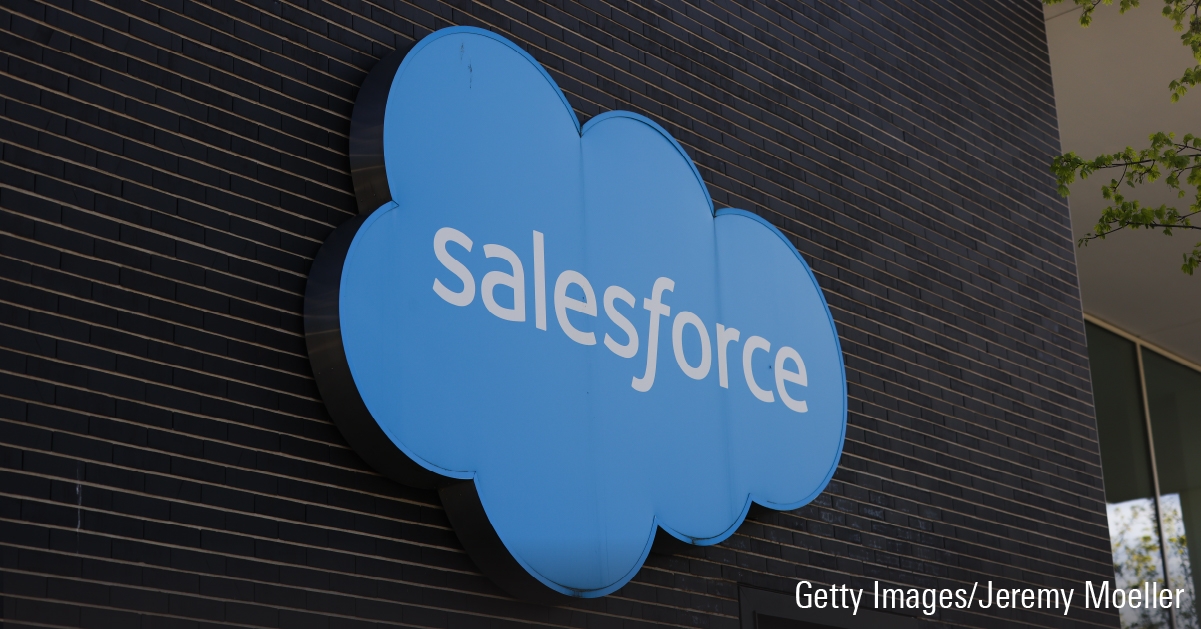
Salesforce CRM released its third-quarter earnings report on Dec. 3. Here’s Morningstar’s take on Salesforce’s earnings and stock.
Key Morningstar Metrics for Salesforce
- Fair Value Estimate: $315.00
- Morningstar Rating: 3 stars
- Economic Moat: Wide
- Morningstar Uncertainty Rating: High
What We Thought of Salesforce’s Q3 Earnings
- Guidance for the fourth quarter was slightly shy of consensus for revenue and non-GAAP earnings per share. But if we consider the $25 million new foreign exchange headwind, revenue strength in the third quarter, and the possibility of some deals getting pulled from January into December, the guidance seems more reasonable.
- Strength in the third quarter was broad-based, with all clouds performing well against our model except Data Cloud, which had a 23% comp a year ago. Management said the segment was about in line with internal expectations. Multi-cloud deals were good. Agentforce was released at the end of the quarter and saw 200 deals. Management says the pipeline is very healthy, and they are excited about the opportunity.
- We still think the company should be a winner in generative AI, with customer service being a key use case. That said, until now, Salesforce wasn’t necessarily doing all that well in generative AI, at least in an obvious way, versus ServiceNow NOW or Microsoft MSFT.
Fair Value Estimate for Salesforce
With its 3-star rating, we believe Salesforce’s stock is fairly valued compared with our long-term fair value estimate of $315 per share, which implies a fiscal 2025 enterprise value/sales multiple of 7 times, an adjusted price/earnings multiple of 31 times, and a 4% free cash flow yield.
We model a five-year compound annual growth rate for total revenue of 9% through fiscal 2029, which we think will be driven by solid growth in all clouds, with the most notable strength coming from the data cloud. Our revenue forecast assumes modest revenue acceleration after depressed growth in fiscal 2023 and 2024. We forecast non-GAAP operating margin expanding from 31% in fiscal 2024 (actual) to the mid-30s in fiscal 2029, which we think is consistent with management’s new profitability focus.
Read more about Salesforce’s fair value estimate.
Economic Moat Rating
For Salesforce overall, we assign a wide economic moat, arising primarily from switching costs, with the network effect serving as a secondary moat source. Based on the company’s product lines, we believe the Sales Cloud, Service Cloud, Salesforce Platform, and others have earned wide moats, while the Marketing Cloud, Commerce Cloud, and Data Cloud have carved out narrow moats. While services (a small portion of revenue) help facilitate software sales and contribute to customer relationships, we do not think the company’s professional services business would warrant a moat on a stand-alone basis. We believe Salesforce’s moat will probably allow the company to earn returns over its cost of capital over the next 20 years.
We believe customers value Salesforce’s discrete clouds as stand-alone solutions, but the various clouds are highly complementary and tightly integrated, making the complete set of solutions more compelling. In our opinion, the strength of these clouds is important, but it should not overshadow the importance of all the solutions being offered under one umbrella by Salesforce as customers are usually looking to consolidate vendors. These factors combine to reinforce our wide-moat assertion. As Salesforce offers a wider set of related and best-in-class solutions, we believe it becomes more deeply entrenched in its customers as they adopt multiple clouds.
Read more about Salesforce’s economic moat.
Financial Strength
We believe Salesforce is a financially sound company. Revenue is showing solid growth, while margins are expanding rapidly. As of January 2024, Salesforce had $14.2 billion in cash and investments, offset by $9.4 billion in debt, mostly related to the Slack acquisition, resulting in a solid net cash position. Gross leverage sits at 0.9 times trailing non-GAAP EBITDA, which we do not view as problematic, given that we expect free cash flow to grow rapidly in the coming years.
Read more about Salesforce’s financial strength.
Risk and Uncertainty
We assign Salesforce a Morningstar Uncertainty Rating of High. From a big-picture perspective, we believe CEO Marc Benioff will be difficult to replace, as he pioneered the software industry, co-founded the company, and led it to be a dominant force with a broad portfolio of sales and marketing-related solutions.
We believe the most important metric for Salesforce investors is revenue growth. Therefore, continued deceleration in the Sales Cloud, or growth that does not materialize as expected in the Service, Marketing, and Commerce Clouds or the Salesforce Platform would likely harm the stock, in our view.
Read more about Salesforce’s risk and uncertainty.
CRM Bulls Say
- Salesforce dominates salesforce automation but still only controls 30% of a highly fragmented market that grows by double digits each year, suggesting there is still room to run.
- The company has added legs to the overall growth story, including customer service, marketing automation, e-commerce, analytics, and artificial intelligence.
- Management will likely focus on expanding margins after years of subscale profitability.
CRM Bears Say
- It may be increasingly difficult for Salesforce to grow faster than its various end markets.
- Salesforce has entered new areas via acquisition and has arguably paid material premiums. Integration risk is real, as is the risk of increasingly large, dilutive, or ill-conceived deals.
- Despite its size, Salesforce has generated substandard margins in recent years, and its renewed focus on profitability may negatively affect already-slowing growth.
This article was compiled by Kayleigh Hall.
The author or authors do not own shares in any securities mentioned in this article. Find out about Morningstar's editorial policies.
















